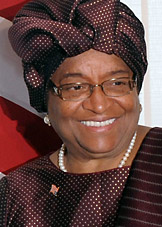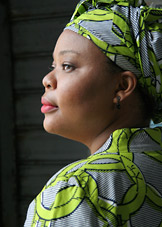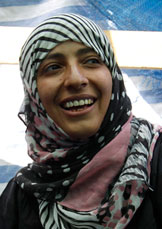Three women share Nobel Peace Prize for 2011
07 Oct 2011
 Ellen Johnson Sirleaf of Liberia, Africa's first democratically elected female president, Tawakkul Karman, the Arab woman who stood up to Yemen's authoritarian regime during the `Arab Spring' and Leymah Gbowee who mobilised and organised women across ethnic and religious dividing lines to bring an end to the long war in Liberia, share the 2011 Nobel Prize for Peace.
Ellen Johnson Sirleaf of Liberia, Africa's first democratically elected female president, Tawakkul Karman, the Arab woman who stood up to Yemen's authoritarian regime during the `Arab Spring' and Leymah Gbowee who mobilised and organised women across ethnic and religious dividing lines to bring an end to the long war in Liberia, share the 2011 Nobel Prize for Peace.
The Norwegian Nobel Committee said the 10 million kronor ($1.5 million) Nobel Peace Prize for 2011 will be divided in three equal parts among Ellen Johnson Sirleaf, Leymah Gbowee and Tawakkul Karman for their non-violent struggle for the safety of women and for women's rights to full participation in peace-building work.
"We cannot achieve democracy and lasting peace in the world unless women obtain the same opportunities as men to influence developments at all levels of society," the committee chairman said.
Since her inauguration in 2006, Ellen Johnson Sirleaf has contributed to securing peace in Liberia, to promoting economic and social development, and to strengthening the position of women.
The diminutive 72-year-old Ellen Johnson Sirleaf was elected president in 2005. Sirleaf, Africa's first elected female head of state, is known as the "Iron Lady" among her supporters.
She is seeking re-election despite promising that she would only seek one term.
 Leymah Gbowee mobilised and organised women across ethnic and religious dividing lines to bring an end to the long war in Liberia, and to ensure women's participation in elections. She has since worked to enhance the influence of women in West Africa during and after war.
Leymah Gbowee mobilised and organised women across ethnic and religious dividing lines to bring an end to the long war in Liberia, and to ensure women's participation in elections. She has since worked to enhance the influence of women in West Africa during and after war.
She is credited with organising a group of Liberian woman in 2002 to put pressure on then-president Charles Taylor to end the country's brutal civil war. After the war Gbowee organised hundreds of female Christian and Muslim activists in nine of Liberia's 15 provinces to help Ellen Johnson-Sirleaf's successful campaign for the presidency in 2005.
 Tawakkul Karman has played a leading part in the struggle for women's rights and for democracy and peace in Yemen, in the most trying circumstances, both before and during the "Arab spring," the Nobel Prize Committee said. She is also the first Arab woman to win the Nobel Prize.
Tawakkul Karman has played a leading part in the struggle for women's rights and for democracy and peace in Yemen, in the most trying circumstances, both before and during the "Arab spring," the Nobel Prize Committee said. She is also the first Arab woman to win the Nobel Prize.
Karman, a 32-year-old mother of three, heads the human rights group Women Journalists without Chains. She has been organising protests against President Ali Abdullah Saleh that began in late January as part of a wave of anti-authoritarian revolts in the Arab world.
The committee said it hoped the prize to Ellen Johnson Sirleaf, Leymah Gbowee and Tawakkul Karman would help to bring an end to the suppression of women that still occurs in many countries, and to realise the great potential for democracy and peace that women can represent.
The Nobel Prize Committee cited a resolution (Resolution 1325) adopted by the UN Security Council in October 2000, which for the first time made violence against women in armed conflict an international security issue. It also underlined the need for women to become participants on an equal footing with men in peace processes and in peace work in general.


















